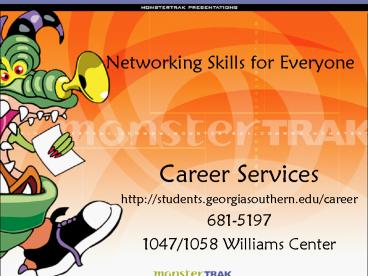Networking Skills for Everyone - PowerPoint PPT Presentation
1 / 19
Title:
Networking Skills for Everyone
Description:
Once employed, inform your contacts of the good news. Why is Networking So Important? ... Nail salon/beauty shop. Graduation Ceremonies. Networking as a ... – PowerPoint PPT presentation
Number of Views:4519
Avg rating:3.0/5.0
Title: Networking Skills for Everyone
1
Networking Skills for Everyone
- Career Services
- http//students.georgiasouthern.edu/career
- 681-5197
- 1047/1058 Williams Center
2
What is Networking?
- Its all about relationship building.
- The process of getting connected in order to
advance your career. - It does not mean asking everyone you run into if
they know of a job.
3
What is Networking?
- Finding a job is not the only reason to network.
Networking also allows you to - Learn more about the profession
- Gain insights into trends in the industry
- Grow professionally
4
Developmental Networking
- Networking for further contacts and referrals.
- Begin constructing a network by compiling a list
of contacts. - Develop a strategy to connect with people.
- Expand your network by asking current contacts
for advice and referrals. - Follow up with your initial contacts and thank
them for their assistance.
5
Strategic Networking
- Lays the foundation for hiring.
- Arrange meetings and informational interviews
with contacts. - Solicit additional referrals.
- Maintain contact by thanking and updating
contacts. - Once employed, inform your contacts of the good
news.
6
Why is Networking So Important?
- The hidden job market75-95 of jobs are never
advertised. - Many of the best, highest paying, and upper-level
jobs are rarely advertised. - 75-80 of jobs are found through networking.
7
Networking Quick Facts
- Expect it to take 31 to 100 days to build a
results producing network from scratch. - Networking vs. Direct Mail
- 2 personal contacts per week for 12 weeks
1 offer - 225 resumes sent 1 offer
8
How To Make Contact
- In Person
- Telephone
9
What Kind of Contacts Make the Best Network?
- People who can
- Give advice, information, referrals.
- Inform you about job openings.
- Introduce you to people with hiring power.
- Hire you immediately or in the future.
10
Best Contacts
- For New Graduates
- Classmates
- Alumni
- Parents
- Relatives
- Faculty/Staff
- Fraternity/Sorority Members
- Members of Professional Organizations
- Chamber of Commerce
- Former/Current Employers
- For Established Job Seekers
- Past or present co-workers
- Family
- Friends
- Religious community
- Neighbors
- Mentors
- Business associates
- Volunteers
11
Top Networking Spots
- Professional and Volunteer Organizations
- Charity/Fundraising Events
- Civic and Community Groups
- Religious Community
- Golf Course
- Tennis/Racquetball/Basketball Court
- Health Club
- Political Campaigns
- Chamber of Commerce
- Nail salon/beauty shop
- Graduation Ceremonies
12
Networking as a Student
- Junior Year
- Develop your resume
- Brainstorm a list of potential contacts
- Make a list of companies you would like to work
for - Sign up on professional listservs
- Conduct informational interviews
- Participate in an internship program
- Join professional organizations
- Senior Year
- Decide where you want to live after graduation
- Join professional associations within your
targeted geographic region - Continue to maintain contact with your networks
- Conduct additional informational interviews
13
Networking for the Shy
- Begin in settings where you know others.
- Join on-line discussion groups.
- Make contact via email or letter before
- phoning.
- Plan what you will say before making the
- initial phone call.
- If someone gives you a referral, ask that
- person to call in advance for you.
- Smile and project enthusiasm and
- confidence.
- Set goals for yourself and celebrate your
- successes.
14
Networking Etiquette
- Know the purpose of networking.
- Do your homework.
- Do not act desperate.
- Remember that networking is a two-way street.
- Listen and respect your contacts time.
- Get permission before using a contacts name to
approach another contact.
15
Selling Yourself
- Develop a commercial about yourself
- Use promotional tools
- Your resume
- A business card
- Networking card
- Resume highlights card
- Personal website (if content is professional)
16
Networking Tips
- Semester breaks are good times to network.
- Continue networking after obtaining employment.
- Network within your company.
- Find a mentor.
- Learn how to read people.
- Speak the language
- Part-time and temporary employment make great
networking opportunities. - Speak and write in your area of expertise.
- Be a helpful network contact for others.
17
Keep Track of Your Contacts
- Business cards
- Rolodex System
- Index Cards
- Computerized Systems
- Organizational Schemes
18
In Summary
- Begin networking early to make the contacts
needed to be successful. - These contacts can assist you in graduate school
planning, job search skills, and future career
development needs.
19
Any Questions?
- THANK YOU FOR YOUR TIME!































